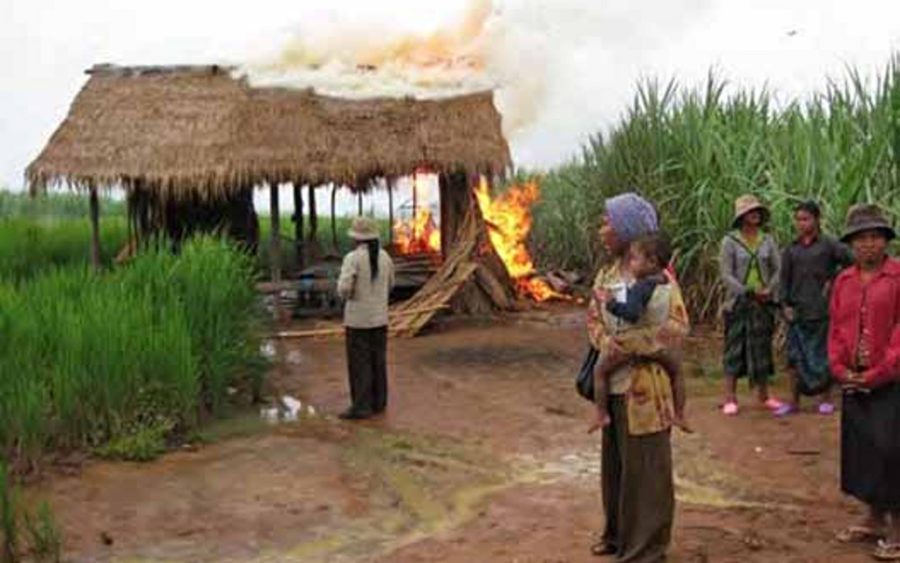More than 700 Oddar Meanchey families on Friday won an appeal in a Bangkok court to pursue a class-action lawsuit against a Thai sugar company, more than 10 years after their houses were burned and razed by military forces including those allegedly hired by the plantation.
Advocacy groups said the decision was “a watershed moment” for human rights, and could set a precedent for holding corporations accountable across the region.
Cambodian residents have been in a dispute with Cambodian companies linked to Thai conglomerate Mitr Phol, which calls itself the world’s third-largest sugar producer, since 2008. The more than 700 Cambodian villagers in the class-action lawsuit say that after the government granted economic land concessions to companies including Angkor Sugar, a Mitr Phol subsidiary, police, military police and others took their land and burned, razed and destroyed their homes.
The National Human Rights Commission in Thailand in 2014 argued Mitr Phol was responsible for the violent eviction, and the concessions were revoked by the Cambodian government in 2015.
A class-action lawsuit was filed in April 2018 on behalf of more than 3,000 villagers in Bangkok’s civil court. The court ruled last July that the case could not be treated as a class-action lawsuit — leaving the villagers to potentially pursue individual claims — and the plaintiffs appealed.
On Friday, the Bangkok South Civil Court decided to grant class-action lawsuit status to the families, who are represented by two plaintiffs and are suing for damages over alleged human rights abuses and economic losses.
Eang Vuthy, director of human rights group Equitable Cambodia, which is assisting the farmers, said the court’s decision was a victory for the 711 families taking part in the lawsuit.
“We very strongly believe this should be treated as a class-action case, based on the situation, based on Thailand’s legal procedure and class-action law,” he said. “What we didn’t expect was the decision of the first court, which said it would be treated as individual cases.”
Ming Yu Hah, Amnesty International’s deputy regional director for campaigns, called the decision “a watershed moment,” potentially setting a precedent for those who wish to pursue human rights and corporate accountability cases across borders.
“After a decade-long battle, the hundreds of affected Cambodian families will finally have their day in court after years of struggle and destitution,” she said in a statement. “A powerful message has been sent to corporate actors across the region that they will be answerable for their conduct.”
According to Amnesty’s brief on case, a U.N. envoy reported that Angkor Sugar, alongside other companies, “hired military forces” to aid in the burning and bulldozing of a village. A 2013 report by Inclusive Development International says Angkor Sugar staff wearing T-shirts branded “Donated by H.E. Ly Yong Phat” destroyed 154 houses under the guidance of local authorities.
Mitr Phol issued a response to the allegations in 2012, saying the surveying of the concession was “led by the local and national government officials,” and “Mitr Phol was excluded from this process and was not a participant.”
“Clearly, there are differing reports characterizing events and the nature of some of the consultations and interaction between locals and authorized local officials, authorized committees of officials, and a court proceeding,” it said. “Mitr Phol has been informed that this process has been according to the law and fully documented.”
Though the ELCs were rescinded five years ago, Equitable Cambodia’s Vuthy said the group was still working with affected villagers to reclaim the land that was taken from them. Only 319 families of the 711 claimants had received any land through the government’s redistribution, and they had received 2 hectares — only a portion of most families’ land, he said.
Vuthy noted that the distribution had been complicated by new migrants, who tried to claim their own stakes in the territory, and many of the families had also missed opportunities to receive their 2 hectares when the government began the redistribution.
Cambodian-produced sugar will be one of the products to lose “Everything But Arms” duty-free trade status with the E.U. next month, which the decision attributed to violent evictions and poor labor standards on sugar plantations.













